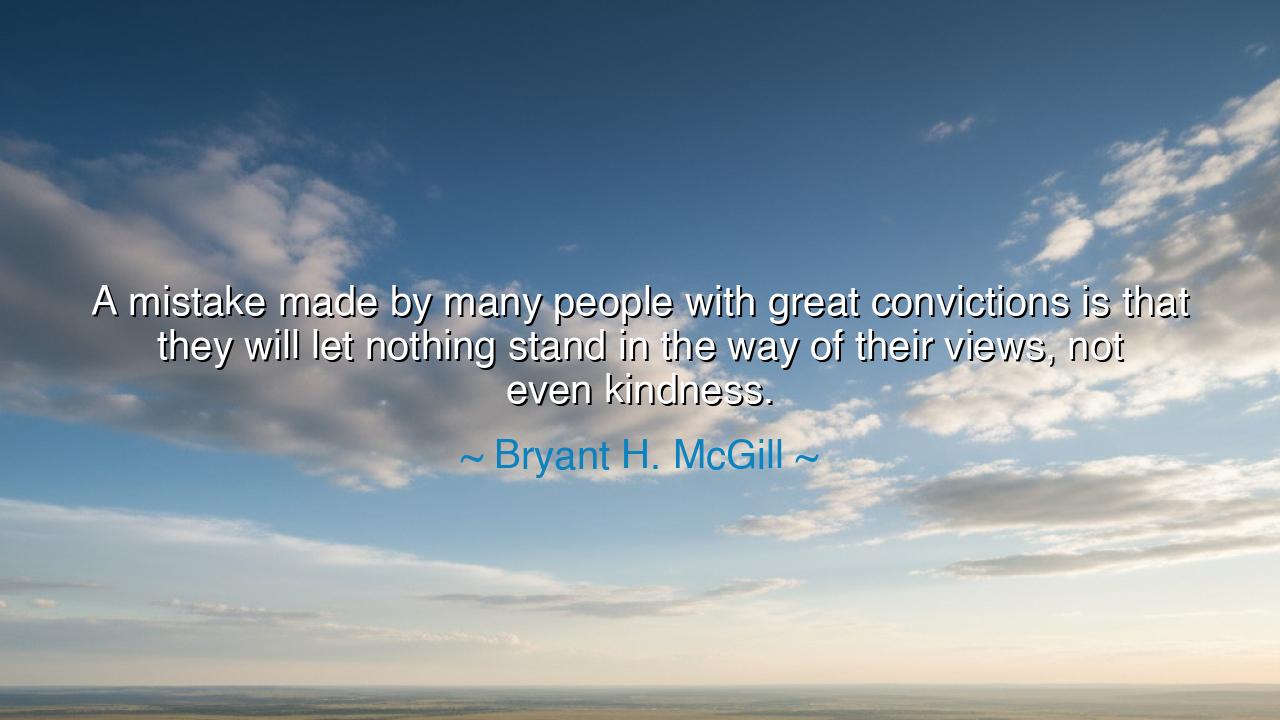
A mistake made by many people with great convictions is that they
A mistake made by many people with great convictions is that they will let nothing stand in the way of their views, not even kindness.






The words of Bryant H. McGill—“A mistake made by many people with great convictions is that they will let nothing stand in the way of their views, not even kindness”—speak to the peril that lies hidden within righteous certainty. It is a warning carved in the wisdom of ages: that even truth, when wielded without compassion, can become a weapon. In this single sentence, McGill exposes one of the deepest contradictions of the human spirit—that we may fight so fiercely for what we believe is right that we forget to be good. And thus, in defending virtue, we may unwittingly destroy it.
The ancients knew this danger well. The philosopher Socrates warned that zeal without understanding leads to tyranny of the soul. The person who clings to conviction without humility begins to see disagreement not as dialogue, but as defiance. They no longer seek to enlighten, but to conquer. Their truth becomes a fortress, and they mistake their walls for righteousness. Yet kindness—gentle, patient, and open-hearted—is the key that opens the gates between souls. To lose it, even in the name of principle, is to lose the essence of humanity itself.
Consider the story of Joan of Arc, a woman of unshakable conviction. She heard divine voices and believed with all her being that her mission was just. Her faith stirred nations, inspired courage, and changed the course of France. Yet, those who condemned her—priests and judges—were themselves men of conviction. They, too, believed they served divine order. Their zeal blinded them, and in their certainty, they burned a saint in the name of God. Thus, the lesson of history resounds: conviction without kindness is a fire that consumes the innocent first.
McGill’s words unveil the tragedy that occurs when belief becomes obsession. Great convictions, untempered by love, can harden into cruelty. The reformer becomes a fanatic; the patriot becomes an oppressor; the faithful become persecutors. In every age, the world has been scarred by those who believed they were saving it. They shouted truth, but not mercy. They defended principles, but not people. And so they forgot that the highest truth of all is compassion.
True greatness lies not in the firmness of belief, but in the gentleness of its expression. A wise person does not crush others with their truth, but invites them into it. Like sunlight through an open window, kindness allows truth to illuminate without burning. When conviction loses kindness, it ceases to be divine and becomes merely human arrogance cloaked in moral pride. The heart, not the argument, is what persuades and transforms.
In the stillness of wisdom, we must remember: it is possible to be right and yet do wrong. The sword of truth, swung without care, can wound deeper than falsehood. For what is truth if it destroys love? What is conviction if it breeds division? The ancients would say that reason without compassion is like a chariot without reins—it races forward, but it knows not where it goes.
Let this be the lesson passed down to those who seek justice and truth: never let conviction devour kindness. Speak firmly, but listen gently. Defend your beliefs, but never forget the humanity of those who oppose you. For in the end, the greatest strength lies not in the victory of argument, but in the preservation of peace. Let your convictions be like the mountain—steadfast and unshakable—but let your kindness be like the stream that flows around it, nourishing all in its path. Only then will you embody the highest wisdom: to be both right and kind, firm in truth yet tender in heart.






AAdministratorAdministrator
Welcome, honored guests. Please leave a comment, we will respond soon